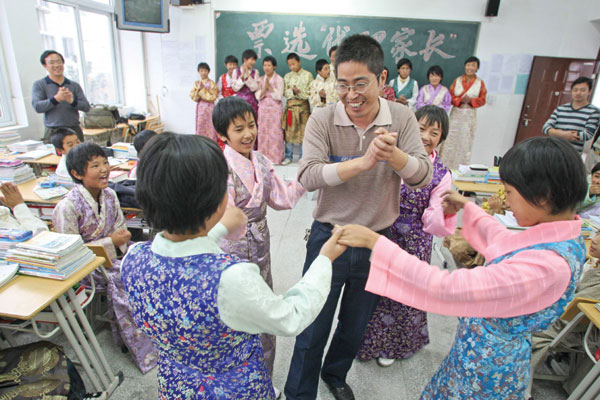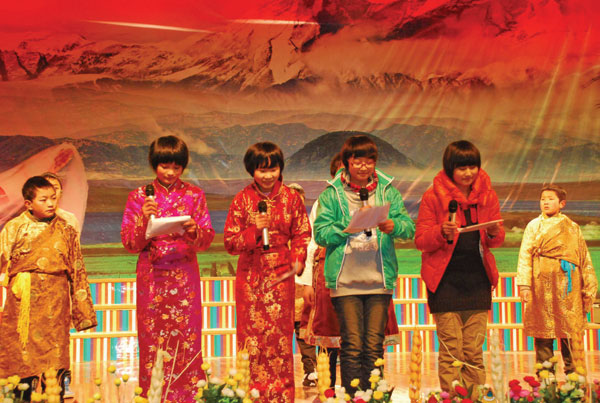Schooled for life
Updated: 2012-02-07 07:59
By Zhang Yue (China Daily)
|
|||||||||||
|
History teacher Wei Shu spends Spring Festival with his Tibetan students. Photos Provided to China Daily |
|
Tibetan students studying at the No 35 Middle School in Hefei, Anhui province, perform at a Lunar New Year celebration. |
A middle school in Hefei, Anhui province, provides the opportunity of an improved education to hundreds of Tibetan children. Zhang Yue reports.
For the 10th time, history teacher Wei Shu spent most of the recent Spring Festival holiday with his students in Hefei, Anhui province, rather than with his family. Even though the 42-year-old has never been to Tibet, he has been schooling hundreds of teenagers from the autonomous region for the past decade.
"Chinese New Year is never an easy time for us," Wei says. "While most students go home for the holidays, Tibetan students stay at school because their homes are so far away. Us teachers also stay and take care of them, even though my family complains about me not being able to enjoy the annual family reunion."
Wei teaches at Hefei No 35 Middle School, which has been educating Tibetan children since 2001. It's the only middle school in Anhui to do this.
His home is only 20 minutes' drive from school, yet he seldom has the opportunity to go home during Chinese New Year.
"We are especially careful with students during the festival, as they are young and easily get homesick," he says.
Wei is one of 23 teachers working with 10 classes of 410 Tibetan students, who study and live at the school. They passed exams in Tibet to get into Hefei's junior high, and only those with high test scores can then go to middle schools elsewhere in the country.
During their four-year stay in Hefei, most students are not able to visit home due to the long distance.
Gu Pingwen, a 40-year-old in charge of the Tibetan students, says the Tibetan students made a strong first impression on him in 2001.
"They all had long hair, whether they were boys or girls, and they seldom bathed or washed their hair," Wei says.
Gu adds they found it hard to adapt and picked up illnesses easily.
"These kids love food with a strong taste. They love iced Coca-Cola and pepper sauce," Gu says. "But these iced, spicy foods cause them health problems, and appendicitis is common."
He recalls that in 2002, all the students in one class had their appendixes removed. Teachers, including Gu and Wei, stayed at the hospital for days at a time that semester.
"For these kids, living independently in a city with very different customs is a big challenge," Wei says. "We try to take care of them just like their parents."
Pubuyangla, a 14-year-old Tibetan girl at the school, is a star at every Chinese New Year celebration because she is an outstanding singer and dancer.
"We Tibetans start singing as soon as we start talking," she says. "And we started dancing as soon as we started walking. Dancing is part of who we are."
This year, she prepared a dance program that combines modern steps and Tibetan elements on the first day of the holiday.
"We all love seeing her dance," Wei says. "It's hard to describe, but it does elicit a different feeling in us."
Yet Pubuyangla was unhappy when she first arrived in Hefei from her hometown in the summer of 2008. It was her first time away from home.
"I could not stop crying that night on the train from Tibet to Hefei," she says. "It was quite crowded. I had never seen so many people together before. It was three nights and two days on the train."
Pubuyangla's home is in Shannan prefecture, which is quiet and sparsely populated. On the second day after arriving at school, she gave her family a call.
"I burst into tears the moment I heard Mom's voice over the phone," the girl says. She had been speaking Mandarin on the train and her mom's greeting was the first word of Tibetan she had heard for days.
During the recent Spring Festival, Pubuyangla and her classmates watched films and TV series, and played badminton, while the canteen served Tibetan food.
Pubuyangla will graduate this year and take an examination for high school back in Tibet. It will be the first time she has returned home since 2008.
"I feel like Hefei is another hometown for me. I learned many wonderful things, like I am a good dancer. I made friends with Han students, and I can speak good English."
She says she wants to go to high school in Tianjin.
"I want to go to the high school for Tibetan students affiliated to Nankai University. From what I have seen on TV, Tianjin is a modern city, and it is near Beijing."
She laughs when she says Tianjin is only 30 minutes by train to Beijing, a place that she has heard of countless times but has never visited.
Wei Shu, Pubuyangla's history teacher, says he has a sense of achievement and joy when his Tibetan students get good grades and talk about their future with him.
"When graduates talk to me online and send me cards, saying how they love what they are doing, I feel all those years with them are completely rewarding," he says.
Today's Top News
Rescuers race against time for quake victims
Telecom workers restore links
Coal mine blast kills 18 in Jilin
Intl scholarship puts China on the map
More bird flu patients discharged
Gold loses sheen, but still a safe bet
US 'turns blind eye to human rights'
Telecom workers restore links
Hot Topics
Lunar probe , China growth forecasts, Emission rules get tougher, China seen through 'colored lens', International board,
Editor's Picks

|

|

|

|

|

|







